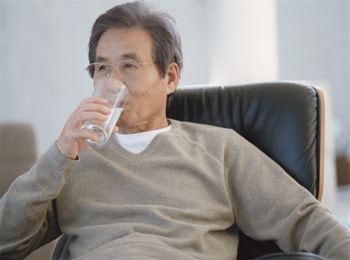Treatment of high fever in the elderly
When NCT has a fever, especially a high fever or very high fever, if not treated promptly, some complications can occur, even life-threatening.
Fever is a reflex of the body and has many different causes, some are beneficial but most are harmful, especially high fever in children and the elderly. When the elderly have a fever, especially a high fever or very high fever, if not treated promptly, it is very likely that some complications will occur, even life-threatening such as kidney failure, cardiovascular collapse.
What causes fever in the elderly?
Fever is relatively divided into mild fever (body temperature from above 37oC to below 38oC), moderate fever (body temperature from 38oC to below 39oC), high fever (when body temperature is above 39oC to 40oC) and very high fever when body temperature is above 40oC. Due to physiological characteristics of the elderly, there are many changes over the years, so all the functions of their body also change. Due to poor resistance, the elderly are very susceptible to fever. If the fever is mild, it is not a cause for concern, sometimes it is a reflex of the body when encountering abnormal conditions (sudden hot and cold, bumps, minor injuries). But the most worrying thing is when the elderly have a high or very high fever.
Fever in the elderly has many causes, but the most dangerous are due to bacterial, viral or parasitic infections. Respiratory tract infections can include pharyngitis, rhinitis, sinusitis, laryngitis, bronchitis. More serious are pneumonia or lung abscess (especially caused by Staphylococcus aureus), tuberculosis (pulmonary tuberculosis, peritoneal tuberculosis, spinal tuberculosis, testicular tuberculosis or generalized tuberculosis). Or gastrointestinal infections such as acute enteritis (typhoid, cholera, dysentery, food poisoning); acute cholecystitis (especially acute cholecystitis); necrotizing pancreatitis or acute hemorrhagic pancreatitis; acute cystitis; dengue fever, rash fever, hepatitis or malaria. In addition, the elderly can also have fever not caused by bacteria such as cancer, blood diseases, endocrine diseases... Besides, there are some cases of elderly people with fever of unknown cause that people usually think of as viral fever.
 |
When having a fever, the elderly need to drink a lot of fruit juice and ORS to replenish water and electrolytes.
Harmful effects of fever on the elderly
When the elderly have a fever, especially a high fever or a very high fever, if not treated promptly, it is very likely that some complications will occur, even endangering life such as kidney failure, cardiovascular collapse. For the cardiovascular system, it can cause rapid pulse, arrhythmia, increased blood pressure (if the patient has a history of high blood pressure, it is very dangerous) or low blood pressure (cardiovascular collapse) due to fever causing dehydration, salt (excessive sweating or accompanied by diarrhea).
Fever is especially common in some patients with chronic diseases such as diabetes, kidney disease, respiratory diseases (pneumonia, asthma, tuberculosis, chronic obstructive pulmonary disease). The most common complication is in the nervous system, if mild, it causes headache, dizziness, more severe is drowsiness, delirium, even panic. Fever in the elderly can also cause nausea, vomiting, abdominal pain, loss of appetite or indigestion, very uncomfortable (infection of the digestive tract, urinary tract). Fever can cause respiratory disorders such as difficulty breathing, shallow breathing; it is also very easy to cause little urination because water is released through sweat, thus affecting the excretory function of the kidneys.
What to do when NCT has fever?
When the elderly show signs of fever, it is necessary to take a thermometer to see how high the fever is. However, in some cases, although the infection is severe, when taking the temperature, there is no fever, or the body temperature is even lower than 37oC. The reason is that the body's resistance and reflexes are too weak, especially in the elderly, weak, lying down for a long time, lack of exercise or poor eating and drinking, unable to absorb or severe malnutrition. These cases need a comprehensive examination to properly assess the disease.
If the elderly have a fever of over 38oC, first reduce the body temperature by using a towel, dipped in a basin of cool water or wet a face towel from a cool tap and apply it to areas with large blood vessels such as the forehead, temples, armpits, and groin. Wear thin clothes, do not cover with a blanket and lie in a cool place. It is necessary to compensate for the amount of water and electrolytes lost due to excessive sweating by giving them plenty of fluids such as lemon juice, orange juice, mango juice, watermelon juice... and ORS solution.
For every 27.5g ORS packet, mix it with 1 liter of boiled water and let it cool and drink as needed. Or you can take 2 level teaspoons of salt and 8 level teaspoons of sugar and mix it with 1 liter of boiled water and let it cool or you can use roasted rice water to drink. Absolutely do not give IV fluids at home or in a clinic that does not have the conditions for care and emergency to prevent shock. When taking the above measures but the body temperature still does not go below 38oC, you can use paracetamol 0.5g each time to reduce fever, after 4-6 hours you can use it again if the fever is still above 38oC. Note that paracetamol effervescent tablets contain sodium bicarbonate salt, so the elderly with high blood pressure should not use it. Moreover, if paracetamol is used for a long time, it will have many side effects, especially affecting liver and kidney function.
If the above measures have been applied but the body temperature does not return to normal, the patient should be taken to a medical facility for diagnosis and treatment to avoid unfortunate complications.
According to Associate Professor, Dr. Bui Khac Hau - Health & Life






